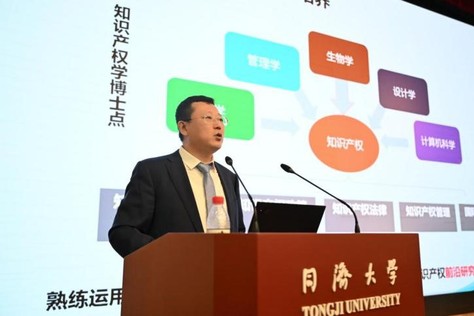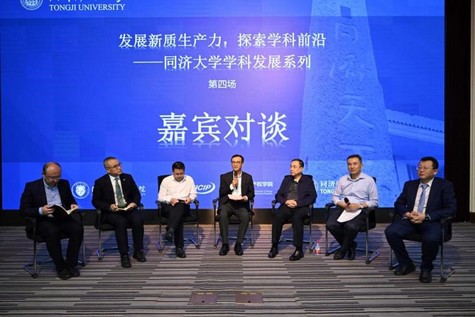

On the afternoon of June 11, 2024, the fourth session of the Tongji University Discipline Development Series Conference was held with the theme Developing New Quality Productive Forces, Exploring the Frontiers of Disciplines. Zheng Qinghua, President of Tongji University and Academician of the Chinese Academy of Engineering, attended and delivered a speech. The conference was also attended by Lü Peiming, Executive Vice President of the university, as well as experts and scholars from Fudan University, Shanghai Jiao Tong University, Zhejiang University, Renmin University of China, Shanghai University of Science and Technology, and other institutions. Yu Xinmiao, Vice Dean (acting) of the Shanghai International College of Intellectual Property at Tongji University, delivered a report on the development of the intellectual property discipline.
Zheng Qinghua emphasized that the development of humanities and social sciences is a key task for Tongji University as it aims to become a world-class university with Chinese characteristics. It is an indispensable part of building a comprehensive, research-oriented, and international university with influence. To address the challenges brought by artificial intelligence, humanities and social sciences must innovate while maintaining their essence, adapting to change and constancy, and responding to national needs. This transformation should include reforms in talent cultivation, curriculum systems, and practical training platforms, promoting the integration of humanities and social sciences with science and engineering fields. The integration of disciplines such as economics, law, and intellectual property with information technology, artificial intelligence, and mathematics is essential to build a world-class humanities discipline with Tongji's characteristics and enhance the influence of humanities and social sciences. He hopes that through the Discipline Development Series Conference, all colleges will further consolidate consensus, promote interdisciplinary integration, and connect resources to achieve greater outcomes.
In the report, Yu Xinmiao, under the title “Supporting the Building of an Intellectual Property Power, Safeguarding the Development of New Quality Productive Forces,” shared the exploration and practice of the intellectual property discipline at Tongji University. Based in Shanghai and oriented towards the world, the intellectual property discipline at Tongji University, characterized by international cooperation and interdisciplinary integration, has gone through a 20-year development process. In 2016, the Shanghai International College of Intellectual Property was established, marking the beginning of a new journey focused on the new technological revolution and industrial transformation, interdisciplinary integration, and global governance reform. The college has gathered top global faculty and has been exploring new pathways for talent cultivation and discipline development. The college has built an all-encompassing learning system called RICH, which is industry-demand-oriented, features international networking, and aims to cultivate high-level intellectual property professionals with both a Chinese foundation and an international perspective, contributing to the building of an intellectual property powerhouse. This approach has already shown initial success, with six graduates now working at the World Intellectual Property Organization (WIPO) headquarters in Geneva.

Entering the digital intelligence era, the college has fully launched the IP Discipline 2.0 initiative, actively integrating into Tongji University's digital and green development plans, to safeguard the development of new quality productive forces. The college focuses on interdisciplinary research paradigms, exploring the evolution, complexity, and challenges of intellectual property issues in the digital era, and planning to establish the Intellectual Property Digital Intelligence Innovation Center. The college is also focusing on global intellectual property reforms that incentivize green innovation, conducting academic and think tank research on issues such as green finance legislation, open patent licensing for green technologies, and international cooperation networks for green enterprises. In the future, the Shanghai International College of Intellectual Property will continue to explore the best models for intellectual property discipline construction and development in China with the support of the United Nations World Intellectual Property Organization (WIPO), the National Intellectual Property Administration (CNIPA), and the Shanghai municipal government, striving to build a world-class intellectual property college with Chinese characteristics.
In the guest dialogue session, Professor Ma Zhongfa, Executive Deputy Director of the Intellectual Property Research Center at Fudan University, commented on the report and provided suggestions for the college’s development. Professor Ma stated that in the era of artificial intelligence, a single-disciplinary mindset and regional or national education models can no longer meet the demands of the times. Universities need to focus on global industry chain layouts, international talent cultivation, and the universality of scientific laws. They must strengthen talent development, scientific research, and social service to support the development of new quality productive forces. The global, cutting-edge, and interdisciplinary features of the Shanghai International College of Intellectual Property are particularly outstanding. The college has effectively leveraged resources from WIPO, Germany, related national organizations, the EU courts, Chinese government departments, universities, and the practical sector, making it a rare high-level intellectual property research platform in the country with significant achievements. Looking ahead, the college is expected to further strengthen its course offerings, especially in optimizing interdisciplinary courses, enhance faculty training, and achieve even greater success.







 0086-021-65983113
0086-021-65983113  sicip_intoff@tongji.edu.cn
sicip_intoff@tongji.edu.cn